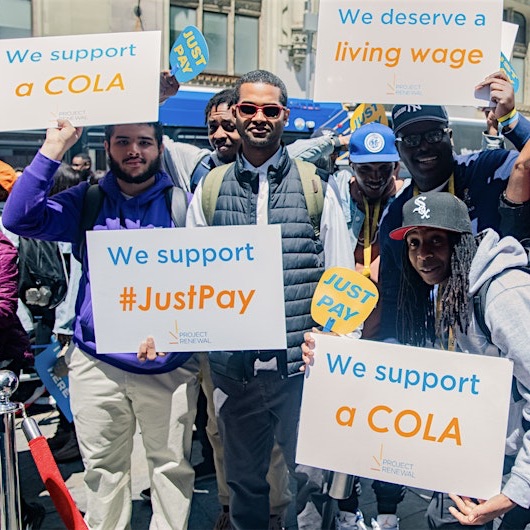
- This event has passed.
A Discussion on Critical Economic Theory with Dr. Julianne Malveaux
January 13 @ 11:00 am - 1:00 pm


The Institute and the Center for an Equitable Economy and Sustainable Society at Howard University hosted an insightful public keynote that explored the intersections of race, economy, and social justice on Saturday, January 13, 2024 at Howard University in Washington D.C.
Esteemed economist, author, and social commentator Dr. Julianne Malveaux headlined as the keynote speaker, providing unparalleled insights into the economic challenges and achievements within Black America. The event was introduced by our Founder, Dr. Darrick Hamilton, a leading scholar in economics, race, and policy, and known for his work on stratification economics and baby bonds. Adding a cultural dimension, Grammy-nominated artist Mumu Fresh performed, bringing a unique blend of music and social consciousness. The closing remarks of the event were presented by Dr. Michael Ralph and Dr. Jevay Grooms, both co-founders of the Center for an Equitable Economy and Sustainable Society. Dr. Ralph is a distinguished professor with a focus on medical anthropology, finance, and politics. Dr. Grooms is an applied microeconomist, whose research interests span public economics, health economics, and studies of poverty and inequality. Spearheaded by two pioneering institutions in their respective fields, this event invited students, scholars, policymakers, and community members to join a critical and enlightening discussion on pressing socio-economic issues.
The public keynote was an extension of the Structural Violence, Race, and Political Economy Symposium, curated by the Center for an Equitable Economy and Sustainable Society and the Institute. Over thirty researchers, activists, and policy officials concerned with the economics and history of structural violence gathered to set the stage for discussion on race that centers on racist thoughts and perspectives. They also explored discrete acts of racialized violence that underscore the economic, political, and historical dynamics that produce and inscribe inequality. The group examined the patterns of discrimination and social institutions that reinforce stratification and have established hierarchies based on physical and identity group differences, particularly race or physiognomy. They also considered gender, sexuality, ability, national origin, geography, education, and expertise. The group insisted that structural violence is not a happenstance occurrence but a systemic process with distribution and allocative consequences. They gathered with the intention of working collaboratively to create academic and public scholarship that advances the concept of structural violence and its impact on society.
Some of the symposium participants shared their reflections on Dr. Malveaux’s keynote address below.
Dr. Malveaux’s speech began by defining economics as the study of distribution that examines who gets what, where, and why. Her research is anchored in critical economic theory, the notion that all laws and structures combine to marginalize Black folks. Critical economic theory forwards an understanding of US capitalism as a form of racialized structural violence.
US capitalism was historically forged and currently sustained by a series of contradictions that conflated freedom, property, and power with Whiteness. Malveaux’s thesis aligns with the historical sociology of Nakano Glenn (2009, p. 2), who contends that “the founders of the nation set up a government based on principles of control by independent (white male) producers who would participate in governance and enjoy freedom. Citizenship status (recognition as a full adult citizen) was tied to labor status (position as a free independent producer).”
Malveaux recounted the brutal history of ‘property lynchings’ that assured the status of capitalist was limited to White men. A key figure in this legacy was the Black postman and store owner, Tommy Moss, whose murder was investigated and publicized by Ida B. Wells in her pamphlet “Southern Horrors: Lynch Law in All its Phases.” Moss was lynched after his successful grocery store, the People’s Grocery Store, competed with a white-owned store. The white store owner later purchased Moss’s store for only eight cents on the dollar following his death, crystallizing the violence that stabilized White monopoly on profit and ownership.
Malveaux traced this history to present-day predatory capitalism, which seeks to extract the maximum surplus value from land and labor at the expense of the laborer and the environment. She highlights the limitations of consumer-based approaches to combating systemic racism, cautioning that “when you buy black, you are still fueling an economy that is oppressing you” and that “we cannot buy our way to freedom.” What solutions are we left with then? Malveaux provides the perfect analogy to think about reform and transformation in tandem. Capitalism, she said, is a wolf. The job of our government, and I would add any of us committed to Black liberation, is to file down the teeth of that wolf with policies and practices that dismantle systemic barriers, redistribute resources equitably, and ensure that economic empowerment is accessible to all, particularly those who have been historically marginalized.
Kimberly C. Burke, a Ph.D. candidate in Sociology at UC Berkeley, focuses her research on understanding the mechanisms of racial inequality within law enforcement and broader societal contexts. Her work, which includes examining the impact of diversity efforts in policing and the effects of policing on interracial interactions, aims to uncover barriers to equity and provide actionable solutions for organizational reforms toward social justice.
During her keynote address at Howard University, Dr. Malveaux made a lasting impression on me when she critiqued the processes and outcomes of structures that aim to create an equitable society. She questioned and challenged the processes that perpetuate inequalities impacting Black life. This led me to reconsider the structure of education offered to Black children in the public school system from a political economy perspective.
I reflected on the violent late 19th-century education model that aimed to convince Black people that they were not yet evolved enough for intellectual instruction and should instead be relegated to manual instruction in preparation for menial labor. Unfortunately, this model is still perpetuated today through the practice of tracking, which assigns students to educational experiences “suited” for their suggested placement in the workforce. This model sustains income disparities and contributes to the psychological violence inflicted upon Black and Brown communities.
Dr. Malveaux’s proposal for a thorough evaluation, identification, and remedy of this structural harm through radical restructuring is timely. We must take action to create a truly equitable society.”
Kristal C. Langford, a doctoral candidate at Rutgers’ Graduate School of Education, explores the impact of the Great Migration on New Jersey’s public schools and their racial dynamics in her historical research. In addition to teaching courses on race, education, and gender studies at William Paterson University, Kristal serves as the Public Historian for the Lost Souls Public Memorial Project and contributes to Revolution 250 New Jersey, focusing on incorporating marginalized voices into educational resources.
Dr. Malveaux urged us to address a clearly flawed economic system by examining the long-term effects of slavery and capitalism, or as she more aptly describes it, predatory capitalism.
If America was built on the backs of slaves, perpetuating the ideology of white superiority and reducing black people to mere capital, it is high time we confront the economic impacts of America’s past on the economic wellbeing of black people and others in this country.
Dr. Malveaux reminds us that Dr. Martin Luther King’s call to action included the redistribution of wealth to mitigate the violent effects of capitalism on black people. She highlighted how lynching in the post-emancipation era led to massive wealth loss among the black community. She also pointed out the historical income disparities and their current effects on transgenerational wealth, emphasizing how predatory capitalism continues to perpetuate these disparities through systemically unfair lending practices, education, and fear-mongering policing. Reparations are a start to eroding the effects of predatory capitalism.
We must push through to break the system that created the structural violence we see today if we want to see a humane and just economy.
Fatima Mboup is an Economics Ph.D. student at The New School. While studying there, she serves as a research associate at the Institute on Race Power and Political Economy and the Federal Reserve Bank of Philadelphia. Her research focuses on real-time macroeconomic data for the U.S. economy, macroeconomic surveys, and macroeconomic modeling.
Dr. Julianne Malveaux, in a charismatic and engaging fashion, began her address by connecting critical economy theory to the work and wisdom of Dr. Martin Luther King Jr. and his unyielding critique of the capitalistic economy.
Disrupting the normalization of poverty and its alignment to an individual’s actions or character, Dr. Malveaux suggests we must focus on the system of laws that work collaboratively to oppress and injure Black people. Built on the premise that both the historical basis of the American economy and its present formation is demonstrative of structural violence, she emphasizes that when considering the most basic definition of the economy, a system of production and distribution, Blacks were, in effect, U.S. capital and thus factors to be calculated in someone else’s wealth.
Akin to an expert storyteller or griot, Dr. Malveaux interweaves narratives of resistance, including those of Ida B. Wells, Elizabeth Keckley, and Anthony Crawford, with policy recommendations on restructuring the American economy. Some of these recommendations include reallocating state-owned land to African Americans and restructuring taxation policies, even among high-income earning Blacks.
Her most memorable line, to me, which deconstructed the education of a classically trained economist, was, “if you believe that the outcome is reasonable, then you believe the process is reasonable.
Dr. Kideste Yusef, Associate Professor and Department Chair of Criminal Justice at Bethune-Cookman University and Director of the B-CU Center for Law and Social Justice, specializes in race and social justice, police-community relations, and structural violence in justice systems. With over twenty years of teaching experience and involvement in initiatives like the “I Fear for My Life” national dialogue, her work focuses on enhancing community-police relations and public safety, underpinned by her extensive academic background in criminal justice and sociology.
Following the insights from the symposium and keynote, I am moved to action. Dr. Malveaux underscores the importance of understanding the roots of inequality, with a particular focus on the role of discrimination and social institutions in systemic stratification. Developing and advocating for policies that target the underlying causes of structural violence is crucial. Unifying the inclusive dialogues among researchers, activists, and policymakers, can increase public awareness. We all can play our part in enacting change, no matter the size of our platform.
Advocating for equitable resource allocation in vital areas such as education, healthcare, and economic opportunities is fundamental. While these efforts may involve implementing legal frameworks, regulatory policies, and community-based oversight to prevent the predominance of any single group’s agenda at the expense of others, they are necessary. Through collaborative networks that unite academia, policy circles, activist groups, and affected communities, we can share knowledge, resources, and best practices.
I am reminded through my interactions with mentors and colleagues that tackling structural violence is a long-term commitment, necessitating continuous effort, and persistence to dismantle deep-rooted systemic inequalities and achieve sustainable change. I’m left ready to do my part and contribute to a lasting legacy of action in pursuit of Black Liberation.
The inaugural Education Stratification Fellow at the Institute on Race, Power, and Political Economy, Tanishia Lavette Williams, with a Ph.D. from the Public and Urban Policy program at The New School, specializes in urban politics, focusing on race, gender, and class. Her research, rooted in her extensive experience in various educational roles, examines the historic and current impact of racism in educational systems, policies, and practices, aiming to address educational disparities and outcomes.


